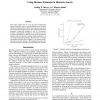Free Online Productivity Tools
i2Speak
i2Symbol
i2OCR
iTex2Img
iWeb2Print
iWeb2Shot
i2Type
iPdf2Split
iPdf2Merge
i2Bopomofo
i2Arabic
i2Style
i2Image
i2PDF
iLatex2Rtf
Sci2ools
AIPS
2009
2009
Using Distance Estimates in Heuristic Search
This paper explores the use of an oft-ignored information source in heuristic search: a search-distance-to-go estimate. Operators frequently have different costs and cost-to-go is not the same as search-distance-to-go. We evaluate two previous proposals: dynamically weighted A and A . We present a revision to dynamically weighted A that improves its performance substantially in domains where the search does not progress uniformly towards solutions, and particularly in certain temporal planning problems. We show how to incorporate distance estimates into weighted A and improve its performance in several domains. Both approaches lead to dramatic performance increases in popular benchmark domains.
AIPS 2009 | Artificial Intelligence | Certain Temporal Planning | Oft-ignored Information Source | Popular Benchmark Domains |
Related Content
| Added | 08 Nov 2010 |
| Updated | 08 Nov 2010 |
| Type | Conference |
| Year | 2009 |
| Where | AIPS |
| Authors | Jordan Tyler Thayer, Wheeler Ruml |
Comments (0)

